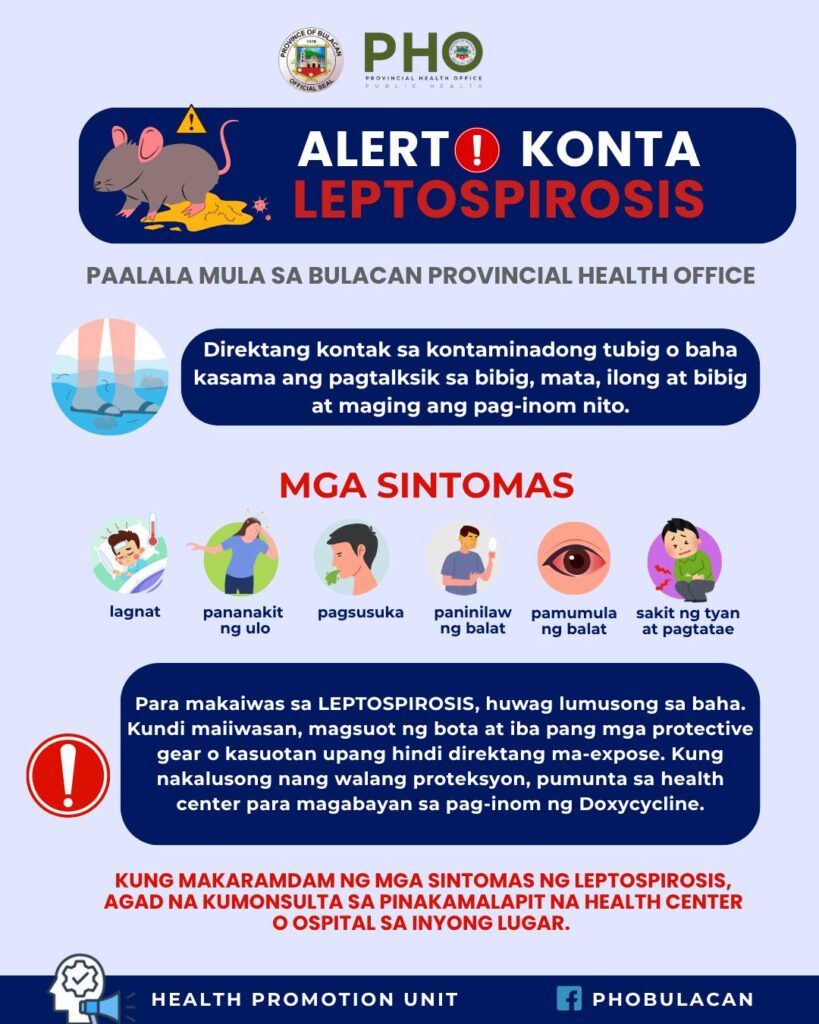
CITY OF MALOLOS — The Provincial Government of Bulacan (PGB), through the Provincial Health Office–Public Health (PHO-PH), has intensified its initiatives to prevent and control leptospirosis, maintaining heightened vigilance despite a notable decline in suspected cases compared to the previous year.
From January 1 to August 9, 2025, Bulacan recorded 114 suspected leptospirosis cases, with only two confirmed positive through the Research Institute for Tropical Medicine (RITM). This marks a 25% decrease from the 151 suspected cases reported during the same period in 2024.
Although the current figure remains 40% below the epidemic threshold, the PGB continues to take proactive steps to protect public health—especially in flood-affected areas vulnerable to the spread of the disease.
Key among the PGB’s efforts is the intensified surveillance and close monitoring of flooded communities. The Provincial Epidemiology and Surveillance Unit (PESU) works closely with city and municipal Disease Surveillance Units to ensure timely data collection, case analysis, and reporting.
To reduce the risk of infection among vulnerable groups, the Provincial Government has distributed doxycycline tablets to 14,850 residents through City and Municipal Health Offices, government hospitals, churches, barangays, and other requesting groups. Likewise, the Department of Health is also in coordination to ensure adequate medical supply.
Health promotion activities are also being carried out across the province where the PHO-PH has been conducting community lectures, distributing information, education, and communication (IEC) materials such as tarpaulins, and utilizing social media and local radio broadcasts to raise public awareness about leptospirosis prevention and early treatment.
According to the PHO-PH, leptospirosis is a bacterial infection caused by Leptospira, typically contracted through contact with floodwaters contaminated by the urine of infected animals, particularly rats. Other animals such as cattle, pigs, and dogs can also transmit the bacteria.
Symptoms may appear four to 14 days after exposure and can include fever, red eyes, diarrhea, skin rash, vomiting, loss of appetite, chills, and coughing. The PHO-PH urges the public to avoid wading in floodwaters, when possible, use protective gear when exposure cannot be avoided, and seek prompt medical attention at the first sign of symptoms.
To prevent contraction of leptospirosis, the PHO-PH reminded the public to avoid wading in floodwaters, wear protective gear when exposure is unavoidable, and seek medical attention immediately if symptoms arise.
Governor Daniel R. Fernando reaffirmed the commitment of the Provincial Government in ensuring public health and safety through sustained and intensified interventions.
“Ipagpapatuloy po ng ating Pamahalaang Panlalawigan ang mas pinaigting na mga hakbang upang hindi na dumami pa ang kaso ng leptospirosis sa ating lalawigan. Asahan po ninyo ang tuluy-tuloy nating serbisyo para mas mapainam pa ang ating pagtugon sa pangangailangan ng bawat Bulakenyo,” he said.
Fernando also assured the public that the Bulacan Medical Center, along with all district hospitals in the province, are well-prepared and adequately equipped to handle any potential increase in leptospirosis cases.
####################
———————–The article provided is authorized for use, and represents solely the author’s personal opinions. Please contact us in the event of any potential infringement.



